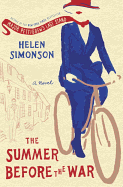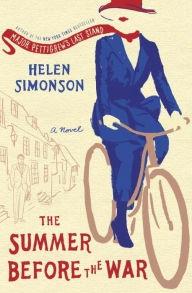
 In the summer of 1914, Beatrice Nash arrives in Rye, East Sussex, to take up a post as Latin teacher at the local grammar school. Sharply intelligent and fiercely independent, she has spent years as her professor father's assistant and amanuensis, enjoying more independence than many single women of her generation. But her father's death has left Beatrice at the mercy of vindictive relatives who control the income he left in trust for her, and she must balance her grief with the new necessity of earning her bread. Helen Simonson (Major Pettigrew's Last Stand) paints a lyrical, sensitive portrait of a young woman and a country on the brink of cataclysmic change in her second novel, The Summer Before the War.
In the summer of 1914, Beatrice Nash arrives in Rye, East Sussex, to take up a post as Latin teacher at the local grammar school. Sharply intelligent and fiercely independent, she has spent years as her professor father's assistant and amanuensis, enjoying more independence than many single women of her generation. But her father's death has left Beatrice at the mercy of vindictive relatives who control the income he left in trust for her, and she must balance her grief with the new necessity of earning her bread. Helen Simonson (Major Pettigrew's Last Stand) paints a lyrical, sensitive portrait of a young woman and a country on the brink of cataclysmic change in her second novel, The Summer Before the War.
Simonson draws her readers in with descriptions of Rye, a quiet country town teeming with local intrigue. Beatrice finds herself at the center of controversy almost immediately, since her appointment is the source of a spat among several town leaders. Under the wing of the formidable but kindhearted Agatha Kent, her staunchest supporter, Beatrice begins to find her way in Rye. She rents a modest cottage, takes in a young female refugee from Belgium, and begins tutoring three local boys in Latin, including "Snout," a proud, reserved Gypsy boy who shows great promise. Agatha's beloved nephews, Hugh and Daniel, quickly become Beatrice's friends. Sober, hardworking Hugh is on his way to becoming a respected London doctor, while charming, bohemian Daniel dreams of moving to Paris to found a literary journal. The outbreak of war on the Continent changes their plans dramatically, and Beatrice and the citizens of Rye struggle to make their way in a newly somber world.
As in Major Pettigrew, Simonson's skill is best displayed in her keen observations about daily life: witty aphorisms such as "Despair had a way of making tea taste bad," and subtly resonant truths, such as the fact that "lovely afternoons do not survive the chill of dusk." Such sentences, like the novel itself, work on multiple levels, but Simonson's compassion and humor keep her prose from feeling heavy-handed. Many of the characters, like Beatrice's grouchy landlady and the gossipy local society women, are comic figures, while others, like Hugh and Snout, are quietly heroic. All of them are vividly portrayed.
"It is the unexpected note that makes the poem," Daniel tells Hugh toward the end of the book. Simonson's novel is full of unexpected notes, which combine to form a harmonious, deeply moving and--yes--poetic whole. --Katie Noah Gibson, blogger at Cakes, Tea and Dreams
Shelf Talker: Helen Simonson's second novel paints a sensitive, witty, luminous portrait of England at the outbreak of World War I.

